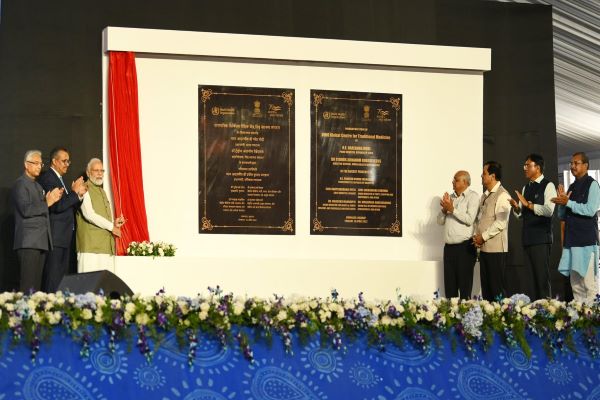Jamnagar’s contributions towards wellness will get a global identity with WHO’s Global Centre for Traditional Medicine

Prime Minister Narendra Modi laid the foundation stone of the WHO Global Centre for Traditional Medicine (GCTM) in Jamnagar on April 19, 2022, in the presence of the Prime Minister of Mauritius Pravind Kumar Jugnauth and Dr. Tedros Ghebreyesus, Director-General, World Health Organization (WHO).
GCTM will be the first and only global outpost centre for traditional medicine across the world. It will emerge as an international hub of global wellness. Union Ministers Dr Mansukh Mandavia, Sabananda Sonowal, Munjapara Mahendrabhai and Chief Minister of Gujarat Bhupendrabhai Patel were among those present.
Dr. Tedros Ghebreyesus, Director-General, World Health Organization (WHO) thanked the Prime Minister Modi for his leadership in providing all the support for the establishment of WHO Global Centre for Traditional Medicine in Jamnagar. The DG termed the centre as a truly global project as 107 WHO member countries have their country-specific governmental offices which means the world will come to India for its leadership in traditional medicine. He said traditional medicines products abound globally and the centre will go a long way in bringing the promise of traditional medicine to fruition. For many regions of the world, traditional medicine is the first line of treatment. The new centre will focus on data, innovation and sustainability and will optimize the use of traditional medicine, he added. The centre’s five main areas will be research and leadership, evidence and learning, data and analytics, sustainability and equity and innovation and technology, said Dr. Tedros Ghebreyesus.
The Prime Minister of Mauritius Pravind Kumar Jugnauth also thanked the Prime Minister for associating Mauritius with the occasion. He highlighted the importance of the indigenous medical system and herbal products in various cultures. He said that there could not have been a more opportune time than now for the establishment of the centre. He also gave details of legislative recognition to Ayurveda in Mauritius since 1989. He also thanked Gujarat for providing scholarships to students from Mauritius for studying Ayurvedic medicine in Jamnagar.
The Prime Minister noted Dr. Tedros Ghebreyesus’s connect with India and his personal involvement in the project of WHO Global Centre for Traditional Medicine (GCTM) he said that his affection has manifested in the shape of the WHO Global Centre for Traditional Medicine. The Prime Minister assured the DG that his expectations from India will be met.
The Prime Minister said “The WHO Global Centre for Traditional Medicine is a recognition of India's contribution and potential in this field”. He further declared “India takes this partnership as a huge responsibility for serving the entire humanity.”
Expressing happiness about the venue of the WHO Center, The Prime Minister said “Jamnagar’s contributions towards wellness will get a global identity with WHO’s Global Centre for Traditional Medicine.” Shri Modi said that more than five decades ago the world’s first Ayurvedic University was established in Jamnagar. The city has a quality Ayurvedic institute in the Institute of Teaching and Research in Ayurveda.
The Prime Minister noted the rising demand for Ayurveda, Siddha, Unani formulations globally as many countries are stressing on traditional medicine for dealing with the pandemic. Similarly, Yoga is gaining popularity across the world. Modi pointed out that Yoga is proving immensely useful in fighting diseases like diabetes, obesity and depression. Yoga is also helping people in reducing mental tension and finding balance in mind-body and consciousness.
The Prime Minister laid down five goals for the new Center. First, to create a database of traditional knowledge system using technology; second, GCTM can create international standards for testing and certification of traditional medicines so that confidence in these medicines improves. Third, GCTM should evolve as a platform where global experts of traditional medicines come together and share experiences. He also asked the centre to explore the possibility of an annual traditional medicine festival. Fourth, GCTM should mobilize funding for research in the field of traditional medicines. Finally, GCTM should develop protocols for holistic treatment of specific diseases so that patients could benefit from both traditional and modern medicine.

Subscribe To Our Newsletter & Stay Updated